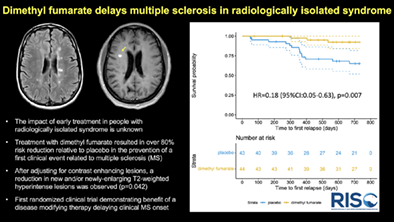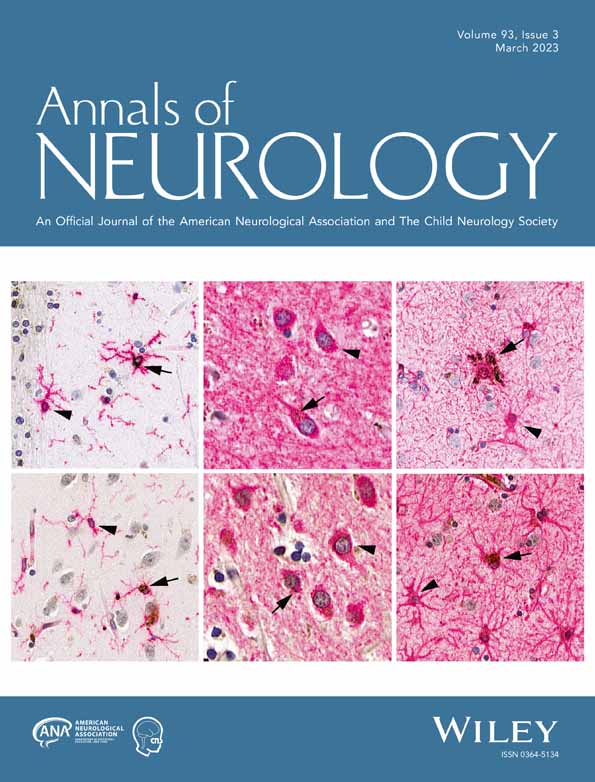Dimethyl Fumarate Delays Multiple Sclerosis in Radiologically Isolated Syndrome
Abstract
Objective
The radiologically isolated syndrome (RIS) represents the earliest detectable pre-clinical phase of multiple sclerosis (MS). This study evaluated the impact of therapeutic intervention in preventing first symptom manifestation at this stage in the disease spectrum.
Methods
We conducted a multi-center, randomized, double-blinded, placebo-controlled study involving people with RIS. Individuals without clinical symptoms typical of MS but with incidental brain MRI anomalies consistent with central nervous system (CNS) demyelination were included. Within 12 MS centers in the United States, participants were randomly assigned 1:1 to oral dimethyl fumarate (DMF) 240 mg twice daily or placebo. The primary endpoint was the time to onset of clinical symptoms attributable to a CNS demyelinating event within a follow-up period of 96 weeks. An intention-to-treat analysis was applied to all participating individuals in the primary and safety investigations. The study is registered at ClinicalTrials.gov, NCT02739542 (ARISE).
Results
Participants from 12 centers were recruited from March 9, 2016, to October 31, 2019, with 44 people randomized to dimethyl fumarate and 43 to placebo. Following DMF treatment, the risk of a first clinical demyelinating event during the 96-week study period was highly reduced in the unadjusted Cox proportional-hazards regression model (hazard ratio [HR] = 0.18, 95% confidence interval [CI] = 0.05–0.63, p = 0.007). More moderate adverse reactions were present in the DMF (34 [32%]) than placebo groups (19 [21%]) but severe events were similar (DMF, 3 [5%]; placebo, 4 [9%]).
Interpretation
This is the first randomized clinical trial demonstrating the benefit of a disease-modifying therapy in preventing a first acute clinical event in people with RIS. ANN NEUROL 2023;93:604–614
Graphical Abstract
This multi-center, randomized, double-blinded trial by Okuda, et al. assessed the impact of dimethyl fumarate (DMF) in the time to onset of first clinical symptoms attributable to a central nervous system (CNS) demyelinating event within a follow-up period of 96 weeks. Treatment with DMF resulted in over 80% risk reduction relative to placebo in the prevention of a first acute clinical event related to multiple sclerosis. A significant reduction in new and/or newly-enlarging T2-weighted hyperintense lesions was also observed.
Potential Conflicts of Interest
Author D.T.O. has been a consultant to Biogen Inc., which owns patent rights to Tecfidera® that was used in this study. D.T.O. also received research support from Biogen Inc. and received royalties for intellectual property licensed by The Board of Regents of The University of Texas System. O.K. has been a consultant and also received research support from Biogen Inc. for an investigator-initiated study. C.L.-F. received research support from Biogen Inc. for an investigator-initiated study. M.P.S. has been a consultant and has received research grant support from Biogen Inc. L.H.H. received a research grant from Biogen Inc. E.M.M. received research support for an investigator-initiated study from Biogen Inc. C.H. holds stock in Biogen Inc; served as an employee of Biogen Inc. at the time of study concept, design, and execution. J.M. is a current employee at Biogen Inc. and holds stock. J.S.W. is a former employee of Biogen Inc. WSV has been a consultant to Biogen Inc. S.D. has been a consultant to Biogen Inc. R.T.N. has been a consultant to Biogen Inc. A.O. has been a consultant to Biogen Inc. G.P. has been a consultant to Biogen Inc. and has also received research grant support. P.R. has been a consultant to Biogen Inc. and has received research grant support. A.S. has been a consultant to Biogen Inc. C.J.A., F.B., L.A., C.v.H., O.S., and D.P. report no disclosures.
Open Research
Data Availability Statement
Radiologically Isolated Syndrome Consortium (RISC) will share deidentified, individual participant data and other study information (study protocol, informed consent, statistical analysis plan, etc.) with academic investigators following publication and approval of a data access agreement by The University of Texas Southwestern Medical Center. All requests should be submitted to Darin T. Okuda, MD ([email protected]).





